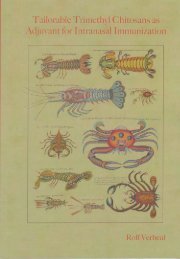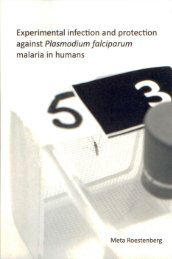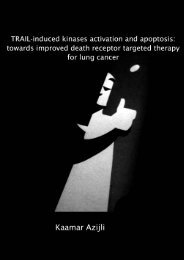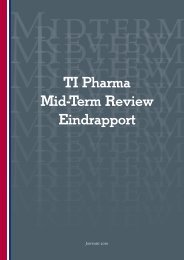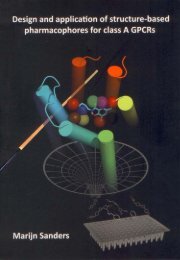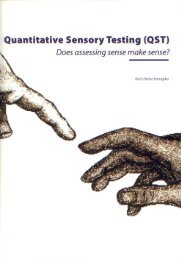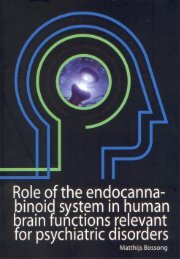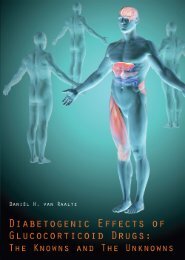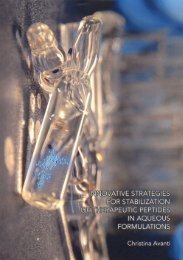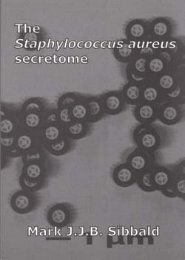The vagus nerve as a modulator of intestinal inflammation - TI Pharma
The vagus nerve as a modulator of intestinal inflammation - TI Pharma
The vagus nerve as a modulator of intestinal inflammation - TI Pharma
You also want an ePaper? Increase the reach of your titles
YUMPU automatically turns print PDFs into web optimized ePapers that Google loves.
Deciphering STAT3 signaling in cholinergic immune-modulation<br />
effect w<strong>as</strong> prevented by transfection with STAT3D (Fig.3). This implies that the antiinflammatory<br />
effect <strong>of</strong> nAChR activation is dependent on STAT3 DNA binding and<br />
the presence <strong>of</strong> STAT3 protein, rather than STAT3 phosphorylation.<br />
TNF (%)<br />
100<br />
50<br />
0<br />
*<br />
*<br />
- + - + - +<br />
EV 3D 3F<br />
LPS (10/ng)<br />
*<br />
Nicotine (1 µM)<br />
Figure 3. Nicotinic inhibition <strong>of</strong> LPS-induced TNF production is dependent on STAT3 DNA<br />
binding, rather than STAT-3 phosphorylation. Peritoneal macrophages were transfected with control<br />
pl<strong>as</strong>mid expressing empty vector (EV) STAT3 or the mutant forms expressing STAT3D (3D) or STAT3F<br />
(3F). Cell cultures were incubated with nicotine (Nico; 1µM), or vehicle, and stimulated with 10 ng/ml<br />
endotoxin for 3 hrs. TNF levels in the supernatants were analyzed by ELISA and values are expressed <strong>as</strong><br />
the percent <strong>of</strong> TNF rele<strong>as</strong>ed compared to vehicle. Data are mean s.e.m. <strong>of</strong> three independent experiments<br />
done in duplicate. *, P < 0.05<br />
Nicotine and STAT3 modulate the cl<strong>as</strong>sical p65RelA/p50NF-kB1 pathway<br />
To determine at what molecular level nicotine inhibits the NF- B signaling pathway,<br />
we <strong>as</strong>sessed the effect <strong>of</strong> nicotine on nuclear translocation <strong>of</strong> p65 subunits in<br />
stimulated RAW macrophages. In line with previous data, nicotine reduced LPSinduced<br />
NF-kB transactivation in RAW macrophages significantly (Fig.4A). As is<br />
shown in figure 4B, LPS stimulation incre<strong>as</strong>ed translocation <strong>of</strong> NF-κB p65 to the cell<br />
nucleus, which w<strong>as</strong> inhibited by nicotine pretreatment. Next, we analyzed whether<br />
the inhibition <strong>of</strong> STAT3 phosphorylation could modulate NF-kB. STAT3 inhibition<br />
with stattic, a well-characterized inhibitor <strong>of</strong> STAT3 phosphorylation7 , prevented the<br />
LPS-induced activation <strong>of</strong> p65RelA in peritoneal macrophages transfected with the<br />
NF-kB lucifer<strong>as</strong>e reporter (Fig 4C). <strong>The</strong> specificity <strong>of</strong> this inhibition w<strong>as</strong> evaluated by<br />
analyzing the different NF-kB proteins using specific DNA probes for each pathway.<br />
LPS enhanced the NF-kB pathway by activating both p65 and p50 (Fig. 4C), and stattic<br />
prevented this activation. This inhibition <strong>of</strong> p65/p50 w<strong>as</strong> specific <strong>as</strong> stattic failed to<br />
affect p52, c-Rel, and RelB.<br />
71



